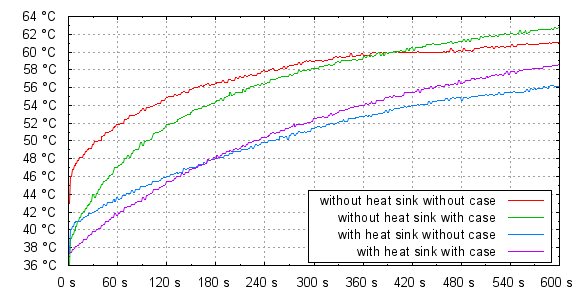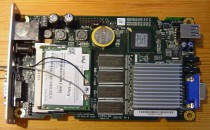A few days ago, while I was compiling some stuff on my ALIX.3D3, I discovered a very high CPU temperature by chance:
M/B Temp: +59 C (low = +0 C, high = +70 C) CPU Temp: +71.1 C (low = +0.0 C, high = +70.0 C) ALARM
I downloaded the datasheet of the AMD Geode LX800 CPU to check which temperatures are OK. On page 598 I found that my model (ALXD800EEXJ2VD) is fine for temperatures from 0 °C to 85 °C. Anyway I looked in my spare part box if I could find a suitable heat sink and fortunately I found a 40mm x 40mm x 9mm one. So I ordered some thermal adhesive and installed it.
To see the advantage of it, I did some measurements. I compiled cpuburn and let it ran with and without heat sink. I tried with and without the case. All measurements were made with a Intel 2915AGB WiFi card and a SanDisk 4 GB Extreme III Compact Flash card installed. Room temperature was between 23.8 °C and 24.5 °C.
 After some start time it's possible to see that temperature differences between the with heat sink and without heat sink curves is about 4 °C. After running the board for about an hour with 100% CPU load with the case, temperature was about 66.6 °C. That's about 4 °C less than the measured 71.1 °C in the screenshot above.
After some start time it's possible to see that temperature differences between the with heat sink and without heat sink curves is about 4 °C. After running the board for about an hour with 100% CPU load with the case, temperature was about 66.6 °C. That's about 4 °C less than the measured 71.1 °C in the screenshot above.
So installing the heat sink results in only about 4 °C temperature difference, but installation was very simple and cheap.

As the temperature curve did not converge against a constant value this data does not say anything.
The time of the data series are too short...
You're absolutely right. The measurements were only to made get a fast overview.
I have an NorhTec MicroClient Jr computer. It has a rather heavy aluminum extruded case with heat-sink-like ripples on the outside. Inside, there is a funny rubber block with adhesive that ensures a thermal contact between the CPU surface and the inside of the case.
If you could figure out a heat sink which would have a reliable thermal contact with your case, I bet you would have a substantial decrease in your measured CPU temperature.
Thanks for your notes on the Alix boards.